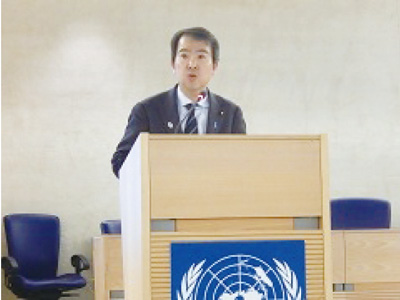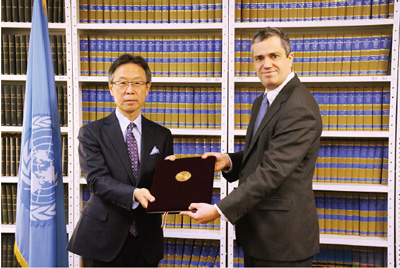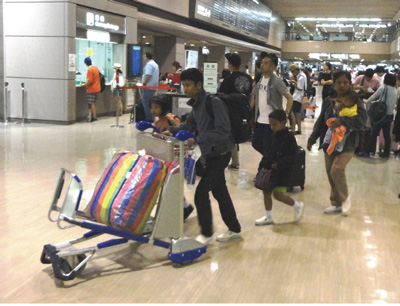Diplomatic Bluebook 2015
Chapter 3
Japan’s Foreign Policy to Promote National and Worldwide Interests
8.Human Rights
A. Initiatives within the UN
(a) UN Human Rights Council
The UN Human Rights Council was established in Geneva, Switzerland, in order to strengthen the UN’s ability to address human rights issues, as part of a movement toward mainstreaming human rights in the UN. The Human Rights Council holds sessions throughout the year (3 regular sessions per year, lasting at least 10 weeks in total), to discuss issues and make recommendations concerning the protection and promotion of human rights and fundamental freedoms. Parliamentary Vice-Minister for Foreign Affairs Hirotaka Ishihara delivered a statement at the High Level Segment of the 25th Session of the UN Human Rights Council in March, in which he referred to various changes in human rights situations around the world and the Government of Japan’s position on these changes. He also outlined Japan’s initiatives regarding women’s human rights and our cooperation with the Human Rights Council. At this meeting, the Resolution on the Situation of Human Rights in the Democratic People’s Republic of Korea (DPRK) that was tabled by Japan and the European Union (EU) was adopted by majority vote (for the seventh time in seven consecutive years). This resolution is stronger than resolutions adopted in past years, reflecting the content of the report of the Commission of Inquiry on Human Rights in the DPRK (COI) established by a resolution in 2013. More specifically, it condemns the widespread and gross human rights violations in North Korea in the strongest terms and urges North Korea to make concrete actions to end all human rights violations urgently, including the abductions issue. It requests the establishment of a structure to follow-up on the COI report and recommends to submit the report to the UN Security Council for its consideration and appropriate action so that those responsible for human rights violations are held to account, including through consideration of referral of the situation in North Korea to the appropriate international criminal justice mechanism. As a member of the Human Rights Council, Japan will continue to be actively engaged in discussions to resolve human rights issues in the international community.
 Parliamentary Vice-Minister for Foreign Affairs Ishihara delivers a statement at a session of the Human Rights Council (March 3, Geneva, Switzerland)
Parliamentary Vice-Minister for Foreign Affairs Ishihara delivers a statement at a session of the Human Rights Council (March 3, Geneva, Switzerland)
(b) The Third Committee of the UN General Assembly
The Third Committee of the UN General Assembly is, along with the Human Rights Council, the UN’s main forum focused on human rights. In October and November, the Committee discusses a wide range of issues, including social development, women, child, racial discrimination, refugees, crime prevention, and criminal justice, as well as the human rights situations in North Korea, Syria, and Iran, among others. Resolutions adopted by the Third Committee are submitted to a plenary session of the General Assembly, contributing to the development of international norms.
Every year, since 2005, Japan and the EU have tabled the draft Resolution on the Situation of Human Rights in the DPRK at the UN General Assembly. In 2014, Japan and the EU again tabled a draft resolution at the Third Committee of the 69th session of the UN General Assembly. It was adopted by majority vote at the November meeting of the Third Committee and the December plenary session of the General Assembly with the largest-ever number of co-sponsors. The content of this resolution is stronger than any resolution previously adopted by the UN General Assembly, as it takes into account the content of the COI report and the Human Rights Council resolution adopted in March. More specifically, in addition to condemning North Korea’s systematic, widespread and gross violations of human rights, it refers to “crimes against humanity” and encourages the Security Council to take appropriate action, including through consideration of referral of the situation in North Korea to the International Criminal Court (ICC). Japan also actively participated in discussions on the human rights situations in individual countries, such as Syria, Iran, and Myanmar, as well as discussions on various human rights issues (social development, advancement of women, etc.). In addition, as it has done previously, Japan dispatched a female representative of a Japanese NGO to serve as the Alternate Representative of Japan at the Third Committee of the 69th session of the UN General Assembly.
B. Initiatives Concerning International Human Rights Law and International Humanitarian Law
(a) International human rights law
The Convention on the Rights of Persons with Disabilities provides measures that States Parties should undertake in order to ensure that persons with disabilities enjoy human rights and fundamental freedoms, and to promote respect for the inherent dignity of persons with disabilities. After signing the Convention in 2007, Japan undertook significant reforms of systems for persons with disabilities ahead of the Convention’s ratification, enhancing the legal framework, including by amending the Basic Act for Persons with Disabilities (August 2011), enacting the General Support for Persons with Disabilities Act (June 2012) and the Act on the Elimination of Discrimination against Persons with Disabilities, and revising the Act for Promotion of Employment of Persons with Disabilities (June 2013). Following this, the Diet approved the acceptance of the Convention in December 2013 and Japan deposited the instrument of ratification of the Convention with the UN Secretary-General, becoming the 141st state party on January 20, 2014. It is anticipated that the acceptance of the Convention will further strengthen efforts to secure the rights of persons with disabilities in Japan, as well as promote international cooperation regarding respect for human rights.
 The deposition of the instrument of ratification
The deposition of the instrument of ratification
The Government’s reports on the status of the implementation of the various human rights conventions in Japan are regularly examined, with reference to the provisions of the relevant conventions. At the examination of the 6th periodic report of the Government of Japan on the International Covenant on Civil and Political Rights (ICCPR; ratified by Japan in 1979) in July and the examination of the 7th to 9th periodic reports of the Government of Japan on the International Convention on the Elimination of All Forms of Racial Discrimination (ICERD; acceded to by Japan in 1995) in August, Japan engaged in constructive dialogues with the committees monitoring these conventions.
(b) International humanitarian law
In February, the Government of Switzerland, the International Committee of the Red Cross (ICRC), and Kyoto University co-hosted a symposium on international humanitarian law, entitled “IHL in Action – 150 years of humanitarian challenges,” to which MOFA sent a representative, who contributed to a meaningful exchange of views. Moreover, as part of its efforts to promote awareness and understanding of international humanitarian law, MOFA delegated a lecturer at the ICRC’s International Humanitarian Law Moot Court Competition.
In addition to initiatives within the UN and other multilateral frameworks, Japan regards bilateral dialogues as a priority, in order to protect and promote human rights. The second Japan–Myanmar human rights dialogue took place in May (in Naypyidaw), the 20th Japan–EU human rights dialogue was held in October (as a videoconference), and the 10th Japan–Iran human rights dialogue took place in December (in Tokyo). In addition to outlining their respective initiatives in the field of human rights, the participants in these dialogues exchanged opinions concerning cooperation in multilateral forums such as the UN.
D. Contribution to Refugee Issues
Japan started accepting refugees from Myanmar under a resettlement program (which is defined as the selection and transfer of refugees from the country in which they have sought protection to a third country that admits them as refugees with a permanent residence status). This is part of a pilot project that was launched in FY2010 (initially intended to run for three years, but extended for another two in 2012), in order to make an international contribution and provide humanitarian aid. To date, 86 people from 18 families have come to Japan under this program.
In January 2014, the Cabinet approved the ongoing acceptance of such refugees from FY2015 as a formal program, rather than a pilot project, and agreed to admit Myanmarese refugees from Malaysia and reunite families from Thailand, by allowing the resettlement of eligible relatives of those already resettled in Japan. It was specified that these family members must also have the ability to be self-reliant in Japan, and have an established relationship of mutual assistance with those already in Japan. Until now, the main destinations for refugees accepted for resettlement were Western countries, and Japan is the first Asian Country to accept resettled refugees. Accordingly, our nation has attracted both high praise and high hopes from the international community in regard to its proactive efforts to address refugee issues. Amid a recent increase in the number of applicants seeking refugee status in Japan, we are continuing our efforts to provide finely tuned support to those who truly need it.
 Refugees under the resettlement program arrive at Narita International Airport (September 26; Source: Refugee Assistance Headquarters)
Refugees under the resettlement program arrive at Narita International Airport (September 26; Source: Refugee Assistance Headquarters)
